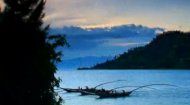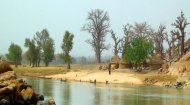|
African Lakes |
African Lakes |
African Lakes | African Lakes |
Explore the mighty Niger River as it flows West Africa including Mali then out into the Gulf of Guinea.
More >
|
|

Main African LakesOne of the most immediate and profound impacts of African lakes is their role as biodiversity hotspots. The Great Rift Valley lakes, in particular, are renowned for their unparalleled levels of endemism, especially among cichlid fish species. Lakes Malawi, Tanganyika, and Victoria collectively host thousands of unique fish species found nowhere else on Earth, representing a living laboratory for evolutionary biology. Beyond fish, these lakes and their surrounding wetlands provide critical habitats for a vast array of flora and fauna, including hippos, crocodiles, countless bird species (both resident and migratory), and various amphibians and reptiles. This rich biodiversity supports delicate ecological balances and contributes significantly to the global natural heritage. Economically, African lakes are indispensable engines of livelihood and development. Fisheries stand out as a primary economic activity, directly supporting millions of people across the continent. Communities living around lakes like Victoria, Tanganyika, Albert, and Turkana rely heavily on fishing for both subsistence and income, making fish a vital source of protein and a cornerstone of local economies. Beyond direct consumption, the fishing industry creates a complex value chain involving processing, transportation, and trade, linking rural communities to urban markets. Furthermore, the freshwater supplied by these lakes is critical for agriculture, enabling irrigation in surrounding fertile lands and supporting farming practices that feed local populations. The lakes also serve as burgeoning centres for tourism and recreation. Their stunning natural beauty, combined with the abundant wildlife they support, attracts visitors from around the globe. Safari lodges, fishing camps, and eco-tourism initiatives flourish around lakes such as Lake Nakuru (famous for its flamingos), Lake Manyara, and the shores of Lake Victoria. This tourism generates significant foreign exchange, creates employment opportunities, and contributes to the conservation efforts of the surrounding ecosystems, acting as a powerful incentive for environmental protection. Historically and culturally, African lakes are deeply interwoven into the fabric of human societies. The Great Rift Valley lakes, for instance, are cradles of humanity, with archaeological evidence suggesting that early hominids flourished along their ancient shores. Today, many indigenous communities along the lake basins have strong spiritual and cultural connections to these water bodies, integrating them into their myths, legends, and daily rituals. The lakes often define the identity of the people living around them, influencing their traditions, languages, and social structures. For many, the lake is not just a resource; it is an ancestor, a provider, and a spiritual home. Beyond food and culture, the lakes are crucial for transportation and trade. Their vast expanses serve as natural highways, connecting communities and even countries that might otherwise be isolated by challenging terrestrial terrain. Lake Victoria, for example, facilitates trade and movement between Uganda, Kenya, and Tanzania, while Lake Tanganyika is a vital transport route for goods and people between Tanzania, Zambia, Burundi, and the Democratic Republic of Congo. Ferries and cargo boats ply these waters, facilitating regional integration and economic exchange. Moreover, the lakes are significant sources of freshwater for domestic use and hydroelectric power generation. Major rivers, such as the Nile, originate from these lakes, providing drinking water to millions and powering hydroelectric dams that supply electricity to large populations, driving industrial growth and improving quality of life. Despite their profound importance, African lakes face significant challenges. Overfishing, pollution from agricultural runoff and industrial waste, the introduction of invasive species, and the escalating impacts of climate change (leading to changing water levels and temperatures) threaten their delicate ecosystems and the livelihoods of millions. Recognising these threats, there is a growing imperative for sustainable management and concerted conservation efforts, involving local communities, national governments, and international organisations. In conclusion, African lakes are much more than mere bodies of water; they are dynamic, living entities that pulse at the heart of the continent. They are ecological treasures, economic lifelines, cultural touchstones, and vital sources of sustenance and energy. Their continued health and vitality are inextricably linked to the well-being and future prosperity of the African people. Protecting these magnificent freshwater giants is not just an environmental imperative, but a fundamental commitment to the continent's sustainable development and its rich heritage. |












